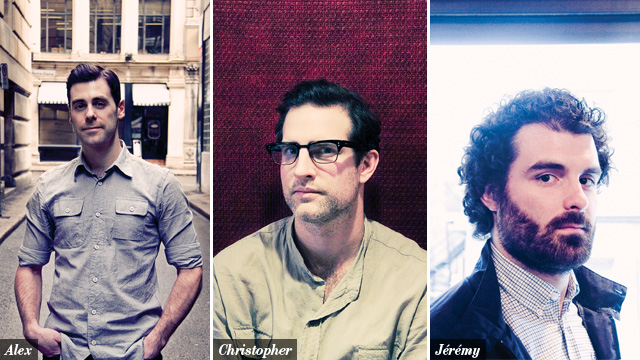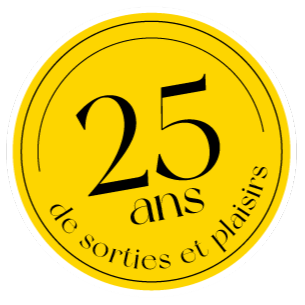The Retailers: it’s a wardrobe renaissance for the young owners of menswear shops Rooney, Les Étoffes and Kapok
Auteur: Thomas Leblanc
“I’m a merchant,” says Christopher Girard, 33, co-owner with girlfriend Diana Taborsky of Mile-End destination shop Les Étoffes. Designed by Antonin Sorel, the space is one of Montreal’s finest retail experiences, with a selection of highly sought-after international labels for men and women – Chauncey, Christophe Lemaire, Unis, Patrick Ervell, Dana Lee and Rag & Bone. The decor is classic and comforting, almost conservative, with wood everywhere and dimmed lighting. Chris, who is tall, slender and sports prescription glasses, is often found wearing neutral-toned garments in ample yet precise fits. But what matters most in the shop is the fabric of his clothes – “étoffes” means elaborate textile in French. “With the shop, I wanted to bring back old school service. Getting down on our hands and knees, tying the shoes, telling customers that they’re hand-made in Portugal, telling them where the leather’s from,” says Christopher with definite passion.
The clothes certainly don’t come cheap: Chris and Diana, like a few other shop owners of the same age in the city, promote quality craftsmanship and savoir-faire with the lines they carry – a mantra not often found in stores on the main shopping drags. If this spirit definitely has a throwback feel, it remains a contemporary trend, complete with its fashion ideology, influential blogs and magazines, design figures and aspirational icons. And in that regard, Chris might be the closest thing Montreal has to a sartorial hero who’s passionate about the way the modern man should dress.
Les Étoffes is obviously not alone in this – down on Notre-Dame Street in Old Montreal, entrepreneur Alex Danino has been influencing the way Montrealers dress since he opened Rooney with his wife Michelle Golfman in February 2006. First carrying graphic-heavy tees, Nike dunks and indie streetwear brands like Alife, the shop is now the city’s HQ for Americana and old Brit-inspired apparel. Shirtmaker Gitman, Swedish label Our Legacy, Montreal denim company Naked and Famous (also at Les Étoffes), English designer Oliver Spencer and Washington-state manufacturer Filson are some of the brands one can find at Rooney.
At 34, Alex is already a fashion industry veteran: he got his start in the field at 13, eventually working his way up to Holt Renfrew, where he spent his undergraduate years learning everything from retail (in the Gucci handbags section!) to manufacturing and wholesale distribution. But why did he make the shift from streetwear to heritage in his shop? “I turned 30, and wanted to evolve. I became interested in different types of footwear, different fits. It was an evolution,” says Alex, acknowledging that magazines, blogs and travel all influence the way he dresses and the products he wants to sell to the public. Talking with him, I quickly understand that Alex also knows what’s good for his business – and the comeback of traditional menswear definitely is.
In a way, we have moved away from ostentatious collector culture (owning 50 pairs of limited edition sneakers!) to a focus on storytelling culture: when we buy a product, we like to know every detail about its origin, the person who made it and, increasingly, the merchant who’s selling it to us. The brand, the marketing, the image: today, all of this is secondary to the material, manufacturing and story behind the product.
THE NEVERENDING STORY
Located on the second floor of a commercial building on Laurier Avenue in Outremont, Montreal’s extension of Hong Kong-based store Kapok also carries exclusive imports, mainly from Japan, France and the US. Opened last summer, the shop is run by Jérémy Guédez, a Frenchman who previously had a career in Paris as the assistant to television personality Thierry Ardisson. Also in his early thirties, Jérémy is, like Chris and Alex, an evangelist of quality craftsmanship. His international background brings eclecticism to the shop, whereguys can find labels such as Porter (legendary Japanese bag label),Bérangère Claire (a Parisian shirtmaker), Bleu de Paname (cotton and denim from France) and Common Projects (a cult NY shoe company).
On my first visit last year, Jeremy was quick to introduce me to Maxx & Unicorn, a Brooklyn-based wallet company hand-making pieces with Italian leather in New York City. I was immediately sold on them and since then, I carry plastic and money in a wallet with a story.
THE WOMEN’S SECTION
And women, do they care as much about the quality of their clothes? Not according to Chris, Alex and Jérémy, except for accessories likes shoes and bags. “Girls have always been more open to fast-changing trends. There is a belief that guys are investing in pieces that will last longer,” Alex tells me when I meet him at his store as he coordinates a photo shoot for his website.
Chris is even more critical. “Men love it, but women don’t give a shit about the story. Women [in Canada] want tons of pieces. We can’t compete with Zara and H&M. You can find a jacket for 60$ in there. In Europe, they have a different mentality – they understand quality. Even in the States, consumers understand the value of clothes better.” Jeremy was surprised to find out that Montreal women were rarely interested in Japanese designers. Fortunately, he discovered local brand Betina Lou.“It works really well. It’s very 1950’s, and they use Japanese cotton.”
THE PRICE TAG
Our three shop-owners react very differently to people’s apprehension to shed real dollars for a high-quality garment. If he’s often discouraged by people’s initial reaction to the price tag on his pieces, Chris believes things will change. “People are gonna get into that European mentality and invest in clothing. If you buy one jacket and keep it for 10 years, it’s an incredible investment!”
“The $100 threshold is also very important here,” reflects Jérémy. And since Kapok is a concept store, he also sells gifts, books, magazines and home accessories – often priced well under a hundred bucks.
“I believe that the spending culture in Montreal is a little different than in New York or Toronto,” says Alex. “Montrealers spend their money at restaurants and bars, and clothing is secondary. They look good, even if they end up looking good without spending too much money. I want to find products with good value and quality. I don’t want to intimidate customers.”
Even if some days are harder than others, Chris seems to still find therapeutic value in the retail industry. “You travel, you don’t make tons of money and you work super hard all the time. You’re not gonna get rich, but you’re gonna get to meet amazing people and do what you love. Every season is a rebirth. You’re excited and you’re nervous. We go through a lot of emotions, it’s very inspiring.”
Rooney | 395 Notre Dame W. | rooneyshop.com
Les Étoffes | 5253 St-Laurent | lesetoffes.com
Kapok | 1069 Laurier | kapok.com
